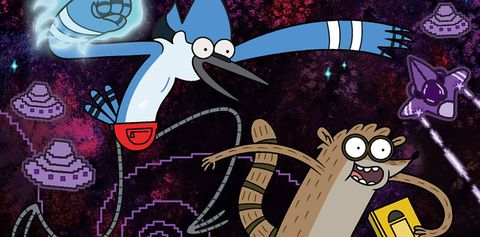Hey you, with the Internet. Do you like Regular Show? Are you on a computer? Great. Head to Cartoon Network's website and play the Fist Punch or Nightmare-athon Flash games on the Regular Show page. Congratulations; you are now having as much fun (or possibly more so) as you would playing Regular Show: Mordecai & Rigby in 8-Bit Land. And unlike the 3DS cart, it didn't cost you $29.99. 8-Bit Land's hook of cross-genre platforming sounds cool in theory, but playing it simply isn't enjoyable.
As with most episodes of Regular Show, we join two of our favorite early-20s cartoon slackers, Mordecai the blue jay and Rigby the raccoon, on what seems like a normal day. Things take a turn for the weird when a mystical game console sucks the duo into a pixelated dimension--which, given the show's usual subject material, isn't too out of the ordinary. What is out of the ordinary is a complete lack of personality to complement the action. Without the voiceless intro cutscene, it feels like you're playing a mediocre platformer that could've starred anyone. Mordecai and Rigby's classic bits ("Hmmm! Hmm! Hmm! Hmm!" and "Yeah-uhhhhhh" come to mind) get obligatory nods at the beginning, then are never heard again.
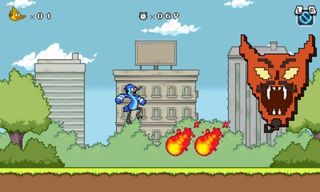
8-Bit Land's core mechanic is that it's primarily a platformer that can change on the fly, making you shift into a Gradius-style shmup or a top-down, Smash TV-esque shooter depending on the level. On paper, this sounds like a neat gimmick, forcing you to adapt to any of three varieties of gameplay at a moment's notice. Problem is, all three modes are inherently flawed--and when you add them all up, they actually become less than the sum of their parts.
Let's start with the platforming, which is plagued by poor hit detection and levels that are infatuated with dead-ends. You only control one character at a time, though you can swap between Mordecai and Rigby with a single button. Rarely will you need to do so: Mordecai is completely superior during the sidescrolling bits, due to the fact that he can double-jump and Rigby can't. Typically, a single hit means death--which is particularly annoying when matched with the spotty hitboxes. Few things in life are as infuriating as trying to jump on an enemy's head, then dying because you were seemingly one pixel off center. It teaches you to simply avoid all confrontation, a method of playing platformers that makes the whole thing less enjoyable.
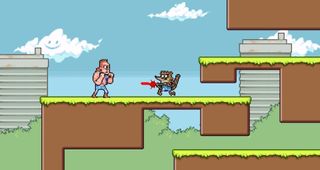
Mordecai's spaceship and Rigby's run-and-gun stretches don't fare much better. The shmup controls are as slippy and slidey as the platforming, and the few enemy types are all boring to fight. It creates that most dreadful of situations, where methodical play is dull but rushing things gets you killed. Rigby's shoot-'em-ups are the most entertaining segments, until you realize that you can destroy enemies from afar before their AI registers your existence. Of 8-Bit Land's measly 16 stages, only the last four actually combine all three modes, a final world which feels far less exciting or intense than it should. Rarely will you ever feel accomplished after beating a level--just relieved that it's over.
All the subpar action is rendered with 2D sprites and 3D wrinkles to the backgrounds, creating a pleasant 16-bit look (despite this being 8-Bit Land). And though they too feel limited, the graphics do as much as they can to convey the personality missing from the rest of the game. For instance, Mordecai and Rigby can power up by snagging a mullet, which comes with complementary jean shorts. When beating a level, you're rewarded with a chiptune "OOOOOOOOOH!" as the pair do a victory dance off the screen. There are also some nice touches, like cameos from the Summer Time Lovin' tape and the Destroyer of Worlds, but the references are way too sparse. Where's Skips? Pops? Muscle Man or Hi Five Ghost? You'll desperately miss their company, because they never show up a single time.
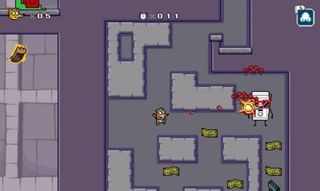
But 8-Bit Land's biggest flaw is that it has no idea who it's targeting. Grown-ups will find the shallow gameplay boring; kids will think it's way too hard, what with the cheap deaths and limited lives. Fans of Regular Show will find none of what they love about the cartoon--the goofy premise, outlandish situations, and hilarious dialogue--in the game. So what's left? Some seriously catchy music, and that's about it. The replay value is almost nonexistent, since all there is to do in each level is collect dollar bills, fanny packs, and golden video tapes. I managed to 100% the game without having any clue as to what the fanny packs do. Turns out, they're continues; this is less of a #humblebrag, and more a befuddlement at why they're never explained or needed.
So there you have it. Regular Show the cartoon is fantastic for the way it turns the ordinary into the extraordinary, packing in plenty of laughs along the way. Regular Show the 3DS game never rises above being ordinary, settling for mediocrity and giving you no reason to enjoy yourself. Skip 8-Bit Land and go play those aforementioned Flash games. Tell 'em GamesRadar sent ya.
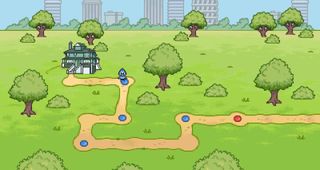
8-Bit Land fails to capture any of the greatness that is Regular Show. The concept has merit, but the execution makes this game entirely skippable.
